
Electronic english version since 2022 |
The newspaper was founded in November 1957
| |
Youth and science
At the Autumn School of Information Technologies
(Ending. Beginning in the Issue No. 47.)
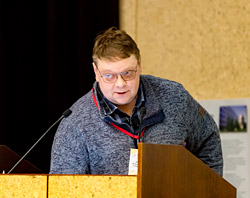 D.V.Podgainy (MLIT):
D.V.Podgainy (MLIT):
- We have carried out another, the third modernization of the Govorun supercomputer. Such a frequency of updates is not due to the fact that the machine does not operate well, on the contrary: since the supercomputer is in demand at the Institute, there are many users, the tasks are completely different and in order to satisfy all requests, so that all users can efficiently calculate, get effective results, we develop our system. This stage is closely related to an increase in operating rate that allows us to increase the number of tasks to be met, yet we have input qualitatively new units into the system, the so-called hyper-converged computing nodes with more storage. They will allow us to widely use such a data system as DAOS and we assume that, in turn, it will significantly advance research using neural network approaches, that is, machine learning techniques. We also hope that the use of a system that will operate on new units will contribute to the provision of a new type of computing resources for computing in the framework of quantum calculations, the use of quantum simulators. Thanks to these new nodes, including the MPD collaboration, it will gain new opportunities and it will be possible to test more "heavy" physics, when event generators take into account more advanced physical models, acquire completely new results, give new predictions for the scheduled experiments at the NICA complex.
Of the tasks calculated on the Govorun, about 40 percent, and these are millions of tasks, are intended for the MPD collaboration. Due to the peculiarities of our machine, a range of tasks could be calculated only on it. The new upgrade provides even more possibilities and complex physics models uniting various physical generators that require more resources can currently be implemented. Thanks to the new resources, physicists investigating processes at NICA will be able to put into operation qualitatively different physical generators, that is, to see, perhaps, a completely different physics - for now, theoretically and when the experiment starts, we will process its results using the resources of the Govorun.
- How much has the Govorun updated?
- At present, we have increased the power by 23% or 202 teraflops and the theoretical total power of the supercomputer is 1.1 Pflops, that is, we have overcome the petaflop barrier. As for all kinds of ratings, looking at them, you cannot say how quickly your specific task will be calculated. Ratings are interesting to compare, yet they, as a rule, have nothing to do with real life.
RAS Academician A.I.Avetisyan (Institute for System Programming, Moscow):
- I am a principled supporter of bringing the youth together, so that they communicate. This communication gives not just some specific results - the lecture was listened to and discussed, it develops horizontal links between the participants. Second. A person often lives in his own narrow world, is involved in simulation or computer security and does not see the rest - not because he does not want to, just there is no time. And here we pull these young people out of their usual environment and say: let's talk. Their horizons expand and for students to learn about a new area that they almost have not known about and may want to do it, is also great. The sooner a person understands what he wants to do, the better.
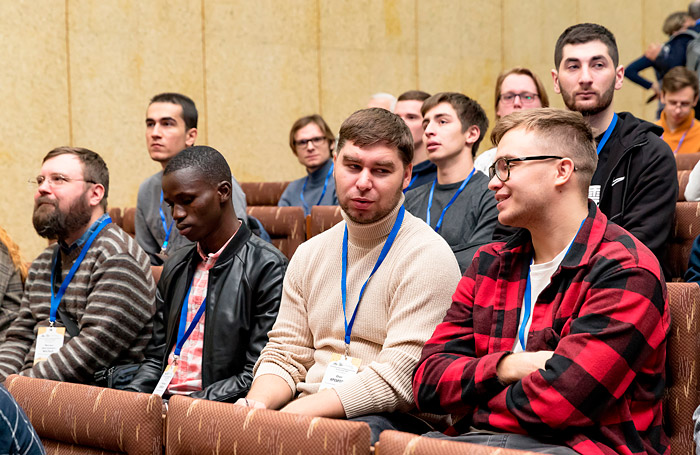
As for the current trends, today, the world has become so complex, the software becomes more complicated that without knowledge one will not be able to do anything even in the case he or she has everything. This complexity needs to be conveyed to the youth so that we understand what we deal with. Perhaps software is the most complex thing that man has created in this world. Today, there are approximately 73 million developers in Github - the main repository of open source and how many people are still around and it all should work together. We must explain this complexity to our children without frightening them, without discouraging them from doing it, so that they go forward armed and can set tasks for themselves for many years to come. That is why such schools are important and useful, because at such points there is a transfer of thoughts, communication, discussion.
Students came to the School from Vladivostok, Petropavlovsk-Kamchatsky, Vladikavkaz, Tomsk, Tula, Tver, as well as from Moscow and St. Petersburg. Some of them have shared their experiences.
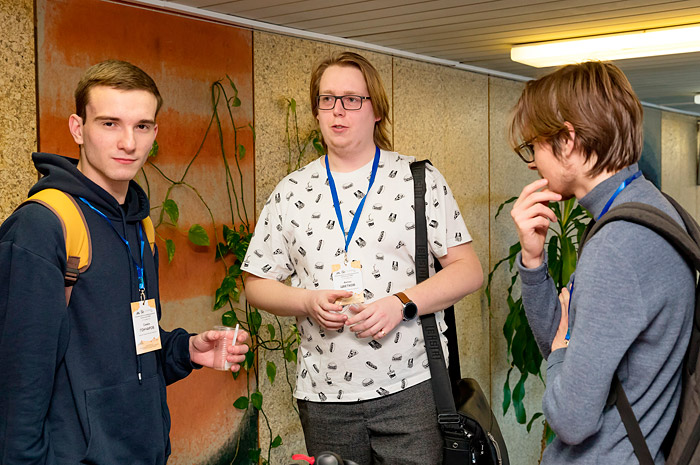
Anton Tsvetkov (Tver State University, specialization "Mathematics and Computer Science"): In terms of general outlook, the School gave especially a lot in physics. Even if you are not a physicist, it is interesting to listen, to understand what research areas there are, what projects are developed at JINR. Particularly, I was interested in lectures on machine learning, according to big data, I pointed out a couple of interesting ideas that I can use in my dissertation. I am finishing my master's degree, I am going to apply for a postgraduate degree at my university and in the future I would like to cooperate or even work at JINR.
Sergey Ognev (Tomsk Polytechnic University): Since we are physicists, many of the things that were told about are unfamiliar to us for obvious reasons and are of little interest. It was interesting to hear about the projects being implemented at JINR in the field of physics. But to take part in them - for myself, I decided that it was too early, not the level of knowledge and the wrong area. I am going to study solid state physics in terms of calculations and simulation. We came here because we are interested in some aspects of programming that we would like to use and we already partially use them, but we are more users than developers. We have been cooperating with colleagues from MLIT for about a year, using the capabilities of the Govorun supercomputer. The goals that I have set for myself when participating in this School - to deal with certain programmes, to implement them and to start calculating - are almost fulfilled, so the trip can be called successful.
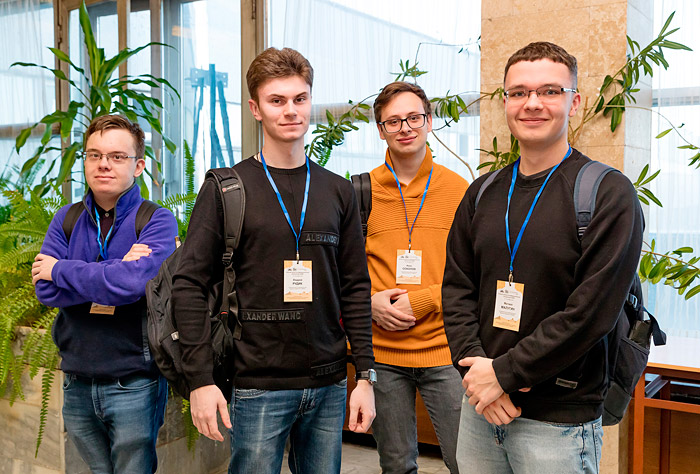
Matvey Malugin (MEPhI): We are not exactly nuclear physicists, we represent the MEPhI Institute of International Relations. The goal of establishing our Institute is to train specialists that will speak with international experts in their native language - that is to say, Anglo-Physicists. We work at the Department of Competitive Systems Analysis, we are involved in programming, scientific data, that is why we were sent here. Everything related to physics and mathematics was difficult to learn, but we tried. The lecture on computer security was very interesting, we heard a lot of new, useful statistics, I liked the lecture on neural networks. Excursion to VBLHEP was just a blast! Very cheerful people work at the production site of superconducting magnets. In general, there is a sincere atmosphere, we like it very much.
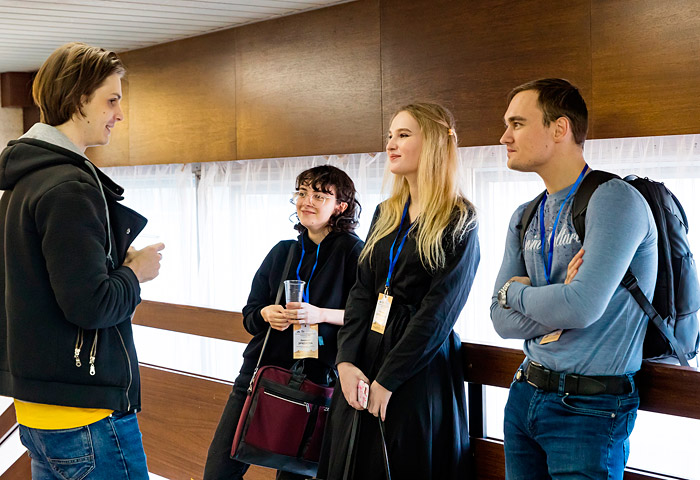
Aleksandr Khmelev (Dubna State University, "Physics"): We got some general ideas in different areas. Of course, this will help to determine the topics of diplomas. We did not learn anything new about JINR - we have been at the University for three years, we have heard about Institute projects and I will do my diploma on Institute topics. But we went on an excursion to the VBLHEP - it was amazing.
Aleksandr's coursemate Anastasia Burakova: This School introduces the activities of JINR and gives some professional skills. We learned about the areas that will be developed at the Institute in the next ten and maybe even more years. They talked about the topics of graduation theses, about the tasks that can be dealt with if to come to the Institute to work. We got acquainted with the leading MLIT scientists, this is a useful acquaintance, from which you can get useful information and some professional skills.
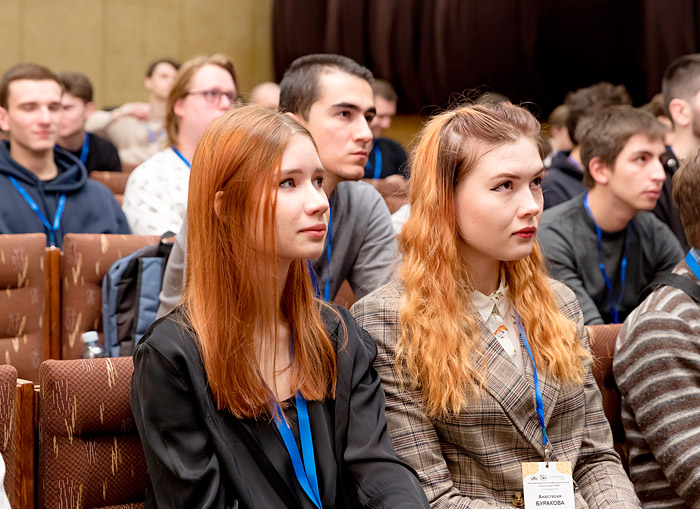
Ksenia Verkhovtseva (Dubna State University, "Information Technologies"): This School is in my specialty, it was very useful, for the lectures contained specifics and applied problems were talked about. One could also choose a narrower area for diploma. As for the rest, I agree with the opinions already expressed by my coursemates.
Parvizi Khomidzoda (Tomsk Polytechnic University): Some of the lectures were introductory, there were also highly specialized ones. I liked the lecture on artificial intelligence, the most wonderful, but the practical lessons were intense. All special lectures were so interesting that I wanted to listen to them without stopping. The excursions were wonderful. Everything is very well organized here, we were quickly accommodated, issued passes, accompanied and fed very well.
Alan Nartikov (Vladikavkaz, school No. 3, 10th grade): I heard a lot of interesting and new things for myself, I liked the excursions. I have not yet decided on the choice of a profession, there are a lot of interesting specialties, but I am sure that I will choose a technical area related to IT. There are so many interesting things to do at JINR, so many different opportunities, it is difficult to decide on the area of work.
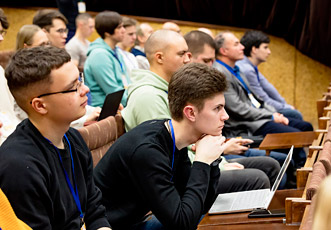
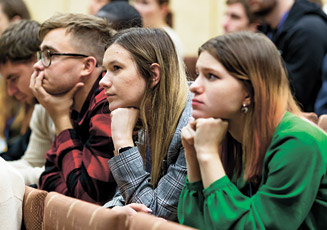
Olga TARANTINA,
photo by Elena PUZYNINA